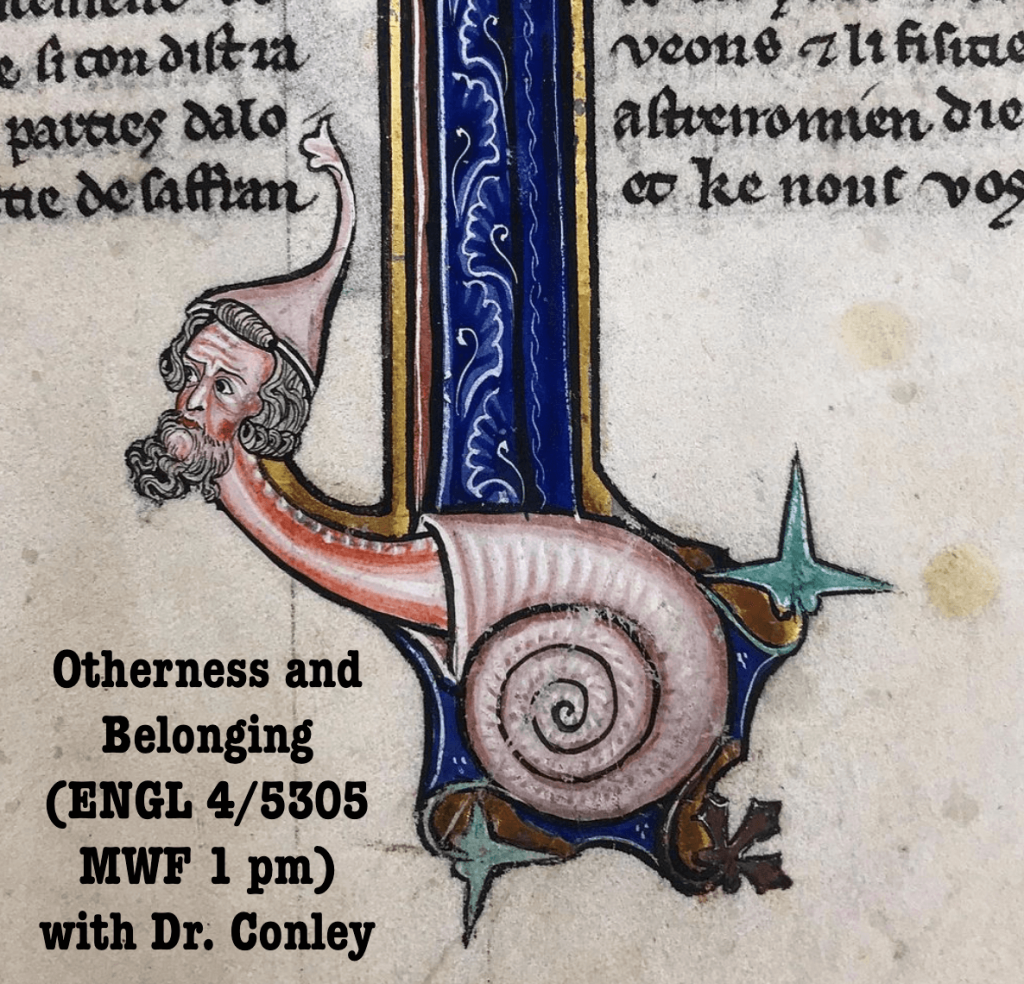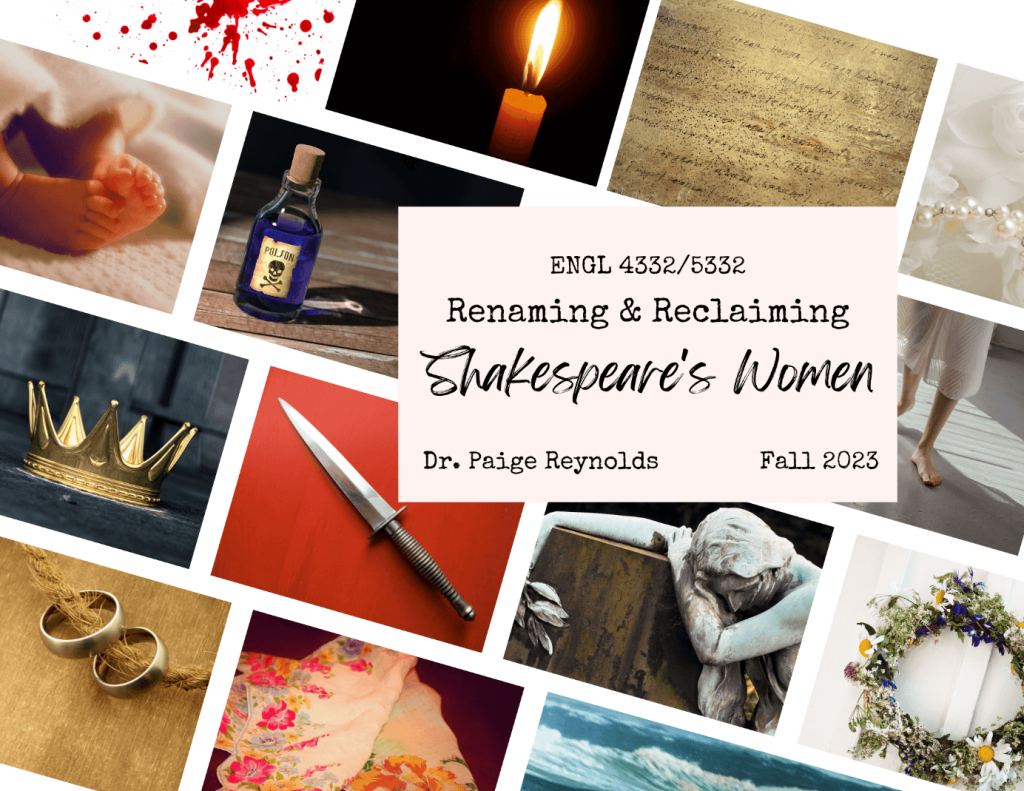ENGL 4305/5305 – Medieval Literature – Otherness and Belonging
Medieval literature isn’t just about knights and dragons and swords! Medieval authors wrote about many of the same concerns and questions that we have today. We all want to belong somewhere, to fit in with our chosen people, and to have a home within our communities. But belonging isn’t always easy or even possible, and that raises some interesting questions: What does it take to fit in, and are there times when it is better not to belong? Who/what gets excluded? What about the misfits, outcasts, rejects, and loners? What can we learn about a society by looking at who they deem “other”? You don’t have to have any prior experience with medieval literature to fit in in this course, so join us!
ENGL 4332/5332 – Shakespeare – Renaming and Reclaiming Shakespeare’s Women
From “shrew” to “baggage” to “unnatural hags,” the names assigned to Shakespeare’s women have ramifications that reach far beyond the pages of the plays in which they live. When we critically interrogate assumptions about, constraints around, and judgment of such characters, what might we discover about the worlds in which they must function? About the power of language to shape meaning on the stage (and off)? About the construction of the plays and the conditions of performance (both in Shakespeare’s day and now)? And about our own cultural attitudes and expectations? We’ll explore these questions (and more!) as we analyze, discuss, and write about text, context, and performance potential through our study of select plays.
ENGL 4335 – Senior Seminar – Values in Motion: Flows of Human, Economic, and Cultural Capitals in Transnational Literature
Although border crossing is a human impulse and activity as old as time, flows of human, economic, and cultural capitals, arguably, did not emerge as the central issues of literary productions and studies until recent decades. This class will explore the multiple ways in which literature can be perceived as being transnational while discussing such topics as cosmopolitanism, diaspora, and globalization through a variety of texts, including Michael Ondaatje’s The English Patient, Chinua Achebe’s No longer at Ease, Edwidge Danticat’s The Farming of Bones, Monique Truong’s The Book of Salt, and short stories by Paul Bowles, Salman Rushdie, Bharati Mukherjee, and Haruki Murakami.
ENGL 4340/5340 – Major Authors – Kazuo Ishiguro: Uncovering the Abyss
In announcing the 2017 Nobel Prize for Literature, the Swedish Academy described British novelist Kazuo Ishiguro as a writer “who, in novels of great emotional force, has uncovered the abyss beneath our illusory sense of connection with the world.” His work probes issues of memory, identity, class, humanity, love, death, and regret—and does so from a dizzying variety of angles, perspectives, and genres. This class will work through a sampling of Ishiguro’s fiction, from early texts, such as the historical novel The Remains of the Day (1989), through the dystopian sci-fi novels Never Let Me Go (2005) and Klara and the Sun (2021), and the fantasy novel The Buried Giant (2015). While all of these texts function, in some sense, as tapestries of memory, they do so in incredibly varied ways, which we will have fun attempting to process.
ENGL 4360/5360 – History and Structure of the English Language
In order to have the best possible facility with the English language, any speaker/writer/reader/teacher of English should know something of the language’s origins and the amazing amount of change it has undergone since that first appearance centuries ago. In ENGL 4360/5360, we will begin by understanding what language is and how it comes to be language. Then we’ll follow the history of the English language from its probable origin, through the major historical periods of its evolution, to its structure and use in the present day. This course is dense with information, but once a person learns to use what it has to offer, their ability to use, understand, analyze, and experiment with English will markedly expand.
ENGL 4382/5382 – Race in American Literature – Race, Cinema, & Childishness
In his book, Between the World and Me, Ta’nehisi Coates proclaims that “racism is the child of race, not the father.”
Provoking many readers to consider the positionality of race, this course will center Coates’s statement as a means to unpack racial complexities using multicultural American literature and film. Students will essentially scrutinize social identity as performance based on race, determining where, or if, the line between childish and fatherly positions in American art forms blur.
ENGL 6323 – Multicultural and Transnational Literatures – Transnational Postmodernism
In this seminar, we will engage a number of 20th/21st Century texts from authors such as W.G. Sebald, Kobo Abe, Clarice Lispector, Jacques Perec, and Akwaeke Emezi. We will examine questions of individual and cultural memory while developing our own critical and theoretical interventions into these texts. As notions of borders and borderspaces become increasingly blurred, we will see how enduring questions of subjectivity, identity, time and memory transcend national, cultural, and aesthetic boundaries.








